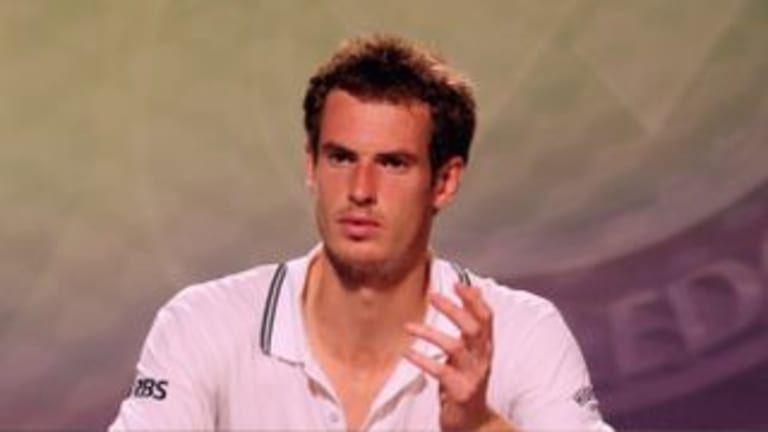by Pete Bodo
Long before Andy Roddick climbed back up from the bottom of a love-40 well on his first service game of the third set, long before Andy Murray flubbed a routine backhand off a Roddick service return to go down 2-4 in the ensuing tiebreaker, and long before that great backhand stab volley that staved off a potential break and eventually enabled Roddick to hold at 3-all in the fourth, before all that, you could see that Roddick was a different man today than he had been in some of his earlier matches here - a different man, in fact, from the one we've known most of these years.
For the Andy Roddick who ambulated across the lime-green lawn of Wimbledon's Centre Court was not the emotional hurricane or the swaggering gunslinger, nor the smoke-belching ace machine - blowing out his breath in great big puffs, like a steam engine - of days gone by. Today, Roddick's presence on the court evoked the single word least likely to come up as the answer to "Andy Roddick" in a game of word association: serenity.
Roddick, a man of 26-plus years who often seems as merrily adolescent as a flip-flop wearing teenager in camo skate shorts, was strikingly quiescent, and as shuttered and focused on the task at hand as a man entranced, and therefore operating in a state suggesting that he'd shed all awareness and fear of every tennis player's greatest enemy: himself.
All the familiar mannerisms were there: he tugged at the brim of his white Lacoste baseball cap until the left side of the brim bore a neat brown smudge the size of a silver dollar; that jack-in-the box serve, with the curiously (and iconoclastically) quick knee bend; that imperious sweep of the racket with which he summons a ball boy to fetch him his towel - all those were the same.
But before each of those habits, and others, seemed outward manifestation of an inward hurry; no matter how he tried, you always sensed that inner restlessness percolating in Andy, that compulsion to bite a nail, tap his heel rapidly while seated, serve a brobdignian fault and then, with almost dismissive haste, load up and pop the second - perhaps so quickly that he wasn't quite sure what to do next for lack of foresight.
Today, though, he telegraphed a purposefulness that obliterated any urgency he might have felt, in a state most comparable to the sort of hyper-clarity movie makers strive to convey by employing slow motion. And in this state Andy was chillingly in command of his raw power and absolutely the master of his emotions. All of it added it up to an inspired performance Friday at the All England Club, as Roddick broke all of Britain's heart by halting Andy Murray's drive to become the first male British subject to contest a Wimbledon final in over 70 years. Roddick won, 6-4, 4-6, 7-6 (7), 7-6 (5) in a wonderful match that nobody will ever confuse with one of those Wimbledon bludgeonings that leave pundits and spectators caviling about the inordinately large role of power in grass-court tennis.
Contemplating his state of mind later, Roddick fell back on less high-falutin' language, saying: "Yeah, you know, I'm just trying to stay the course. I'm just going about it.. . .I mean, I knew going in that getting all hyped up, and up and down, especially in an atmosphere that probably wasn't gonna be super favorable to me, wasn't probably the way to go. And especially, you know, he was probably gonna have the edge as far as, you know, kind of the adrenaline and the emotion. So I kind of just wanted to stay the course. I was fully aware that there might be ups and downs. You know, I just wanted to kind of keep the same face regardless."
Murray's own analysis was even more meat and potatoes than Roddick's. He said, "He served great. Served really, really well in the tiebreaks. I think he maybe missed two first serves. The second one wasn't until 6-4 in the (fourth-set) tiebreak (a point that Roddick lost when he charged the net and Murray whistled a passing shot by him). He was serving really well at the start. And I had a few chances, you know, in the first tiebreak. I had chances early in the third set, too. I didn't take them. . . Like I say, if someone serves 130 miles an hour consistently throughout the match, you know, in the high like 75s to 80%, it's very tough to break them, especially on a court like this that's quick."
